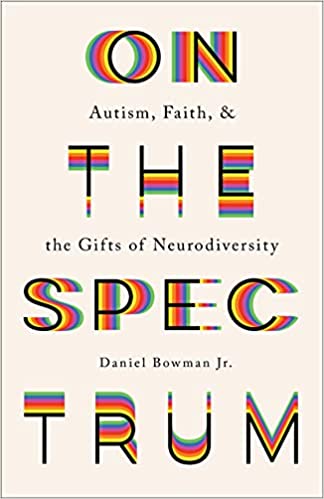
On the Spectrum {Book Review}
I received an advance copy of this book via NetGalley in exchange for my unbiased review.
I’m an adult-diagnosed autistic Catholic, and Daniel Bowman’s profound, beautiful, and necessary book On the Spectrum: Autism, Faith, and the Gifts of Neurodiversity (Amazon affiliate link) soothed a very rumbly place inside my soul.

This collection of essays ranges in length and focus, but they all bear Bowman’s signature frank, earnest style. I appreciated his commitment to honesty and vulnerability from the opening pages, which outline one of his darkest experiences, one that nearly cost him his marriage, his family, and his very life. Depression, anxiety, and trauma are common among autistics — whether diagnosed in adulthood or childhood — due to years of skewed interactions in a neurotypical world; Bowman gains our trust as a narrator by confronting these painful truths up front.
In the words that follow, he moves skillfully from grief to joy, isolation to community, building a vision of possibility and hope. I especially enjoyed his discussion of his autistic experience of place, and how he approaches environments through physical presence, research, and literature. His piece on the dangers of bad literature (and how the dishonesty of bad storytelling is an affront to the autistic core sensibility of honesty) was also invigorating and wise, an indication of the depth of his gifts as a teacher.
His discussion of the intersection of his autism and his Christian practice resonated strongly for me, particularly his self-recrimination about not always being able to engage in Christian service in standard and expected neurotypical ways. He notes, “Because I have to engage life at such a profound level in order to enter into any Christian service, the good news is that it generally has a transformative effect on me… if I can say yes.” That “if” can be a hard and lonely place to reside, and his discussion of the ways he is honoring both his God-given gifts within the context of his God-given natural limitations is a strong opening gambit toward a larger conversation within individual church communities about building paths for active discipleship and ministry for people with all kinds of disabilities.
If there is anything this book lacks, it is an acknowledgement that, for all his challenges, Bowman’s support needs are lower than many other autistic people’s. His vision of community-supported life would be much more challenging, if not impossible, for someone with intellectual and physical disability or communication differences related to their autism. There is a great (and paradoxically inaccessible) need for #OwnVoices stories about autistics with higher support needs, who are often consigned to bleak state-supported living, over-medicalized or even torturous programs, and subhuman theories of mind… even within the walls of Christian churches.
Bowman is lucky to have supportive family, friends, and colleagues, and he acknowledges this. But that nexus of support was built through painstaking conversation, hard work, honest feedback, and many mistakes along the way. This is how Christian communities are built, how we manifest the Kingdom of God on Earth. I’m grateful for Bowman’s entry into the public work of carving an openly autistic space in those endeavors.
